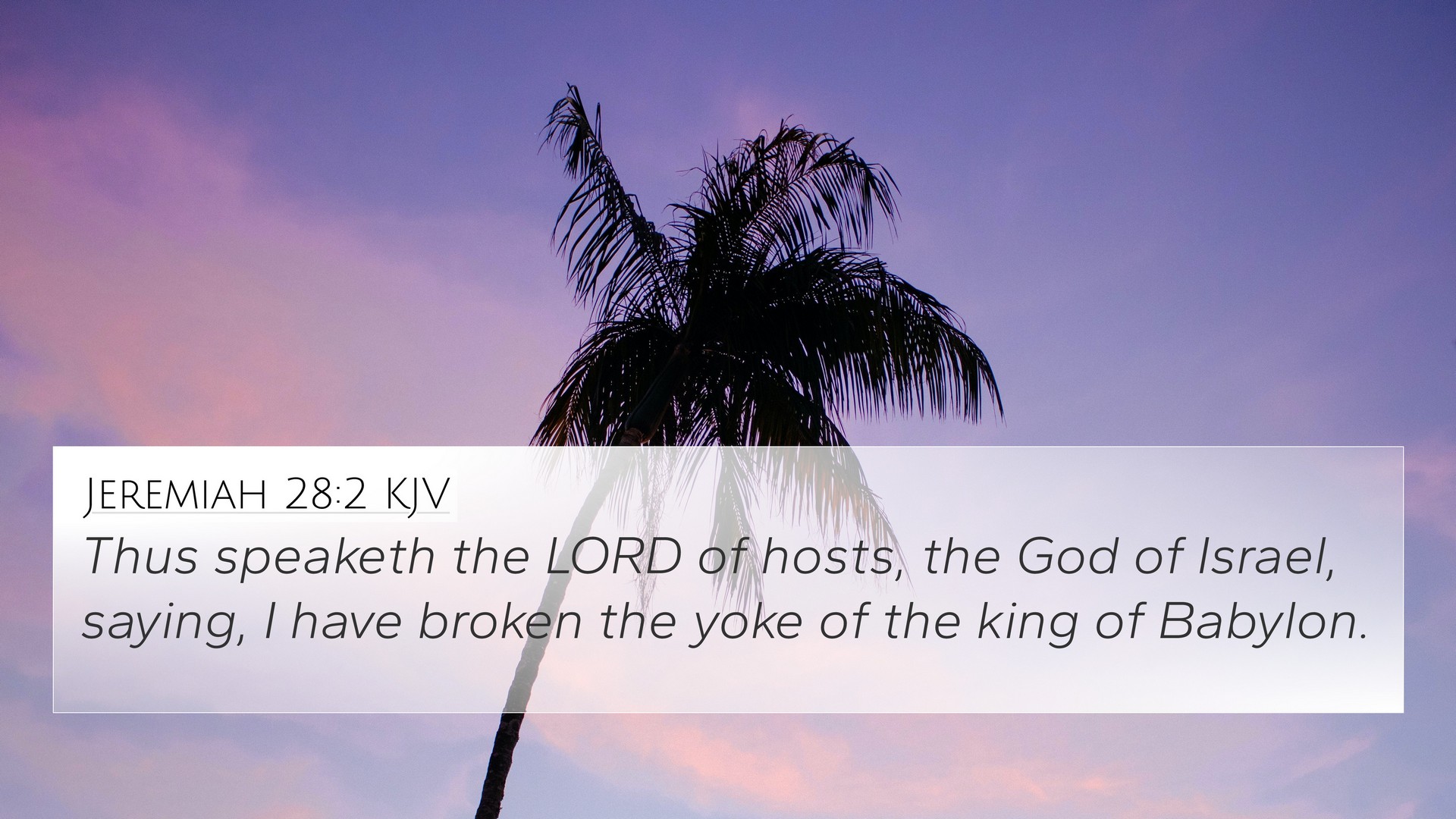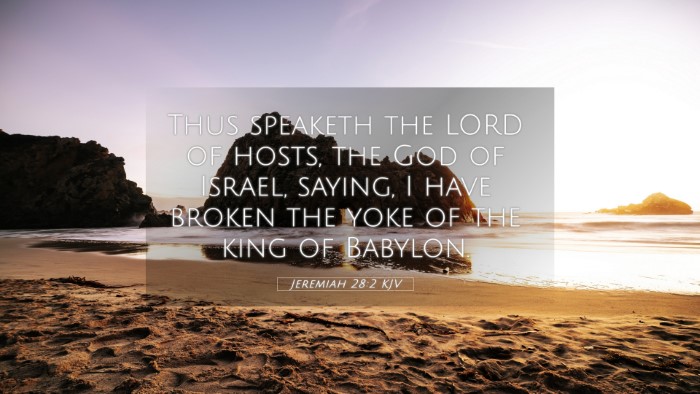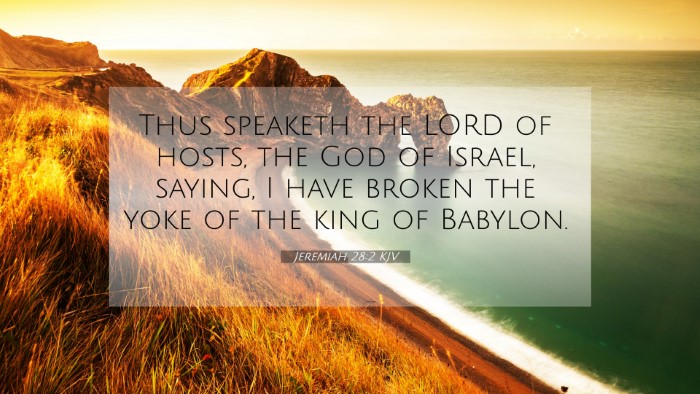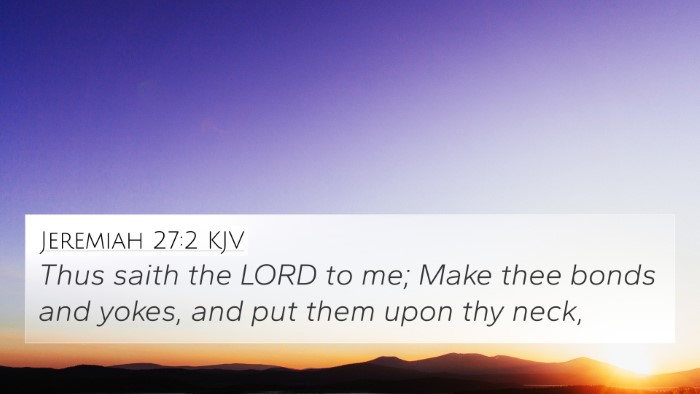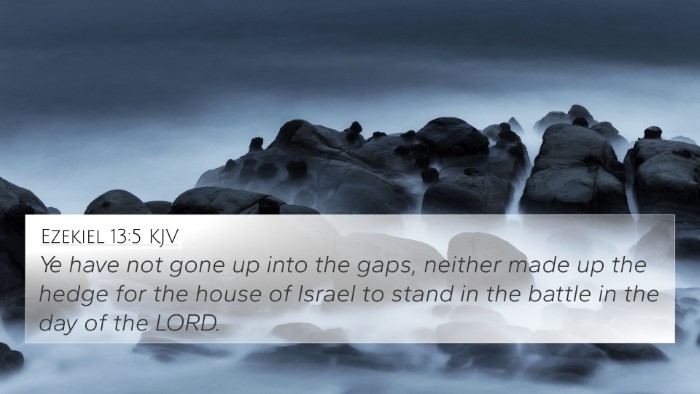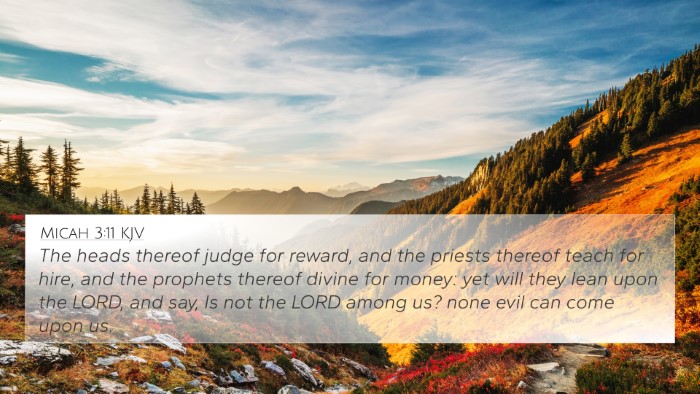Understanding Jeremiah 28:2
The verse Jeremiah 28:2 states:
"Thus speaks the Lord of hosts, the God of Israel, saying: 'I have broken the yoke of the king of Babylon.'
This verse is significant within the context of the message delivered by the prophet Jeremiah, and it highlights crucial themes in the tapestry of scriptural analysis. Below is a detailed exploration of its meaning, combining insights from various respected public domain commentaries.
Summary of Jeremiah 28:2
In this verse, the prophet Jeremiah relays a message to the people concerning the impending fall of Babylon. The declaration portrays God as the ultimate authority, affirming His control over nations and the destiny of His people.
Commentary Insights
- Matthew Henry: Henry emphasizes the boldness required for a prophet to declare such a message, especially against the dominant power of Babylon. He suggests that this declaration reflects God's sovereign will and His promise to liberate His people from oppression.
- Albert Barnes: Barnes discusses the significance of the term "yoke," describing it as a metaphor for subjugation. He explains that breaking a yoke symbolizes the end of oppression, and hints at God's plan for restoration and judgment against Babylon.
- Adam Clarke: Clarke provides a historical context, noting that the prophecy directly contrasts the prevailing messages of false prophets who predicted peace while Jerusalem remained under siege.
Thematic Connections
This verse invites cross-referencing with several other scriptures that deal with themes of divine authority, judgment, and hope. Below are references that illuminate these connections:
- Isaiah 14:4: "That you will take up this proverb against the king of Babylon, and say: 'How the oppressor has ceased, the golden city ceased!'" - Similar theme of judgment against Babylon.
- Jeremiah 27:7: "So all nations shall serve him, and his son and his son's son, until the time of his land comes; and then many nations and great kings shall make him serve them." - Context of Babylonian supremacy.
- Lamentations 3:34-35: "To crush under one's feet all the prisoners of the earth, to deny a man justice in the presence of the Most High." - God's justice against oppression.
- Ezekiel 30:18: "At the day of judgment I will cause the yoke of Egypt to be broken, and I will scatter them among the nations." - The theme of broken bondage.
- Micah 4:10: "Be in pain, and labor to bring forth, O daughter of Zion, like a woman in birth pangs..." - Indicates the struggle leading to liberation.
- Revelation 18:2: "And he cried mightily with a loud voice, saying, 'Babylon the great is fallen, is fallen, and has become a dwelling place of demons...'" - The ultimate judgment on Babylon, echoing Jeremiah's prophecy.
- Zechariah 1:16: "Therefore thus says the LORD: 'I am returning to Jerusalem with mercy; My house shall be built in it...'" - Restoration theme echoed from God's promises.
Connecting Themes in Scripture
This verse is particularly rich for comparative Bible verse analysis. Here’s how it connects with broader scriptural themes:
- Divine Authority: Throughout scripture, God's sovereignty is affirmed (Psalm 103:19; Proverbs 21:1).
- Judgment and Restoration: A recurring biblical narrative where God judges nations but also restores His people (Isaiah 61:4; Zephaniah 3:19).
- Hope Amidst Despair: The messages of hope amid enslavement resonate through various books like Jeremiah and Lamentations (Lamentations 3:22-23).
Conclusion
Jeremiah 28:2 serves as a significant verse in the understanding of God's plans and deliverance for His people from earthly powers. It invites believers to explore the profound themes within the Bible and encourages deeper study using tools for Bible cross-referencing. By examining connections between Bible verses, one can appreciate the unity and continuity of God's message through history.
Cross-Referencing for Deeper Understanding
If you wish to engage in cross-referencing Bible study methods, consider utilizing resources such as a Bible concordance or a cross-reference Bible study guide, which can help you find similar themes and teachings throughout scripture. Detailed cross-reference between the Gospels, for instance, can reveal the essence of Jesus' fulfillment of Old Testament prophecies and further enhance understanding of prophetic books like Jeremiah.
